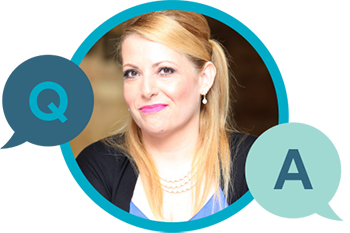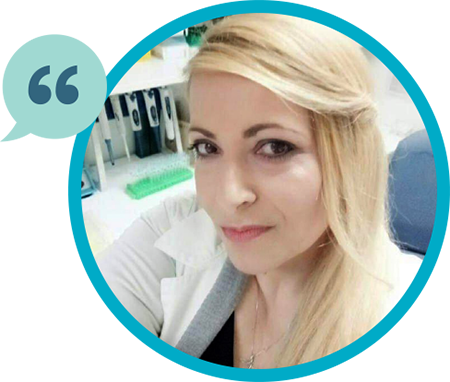
I’m Dr. Vasiliki E. Kalodimou, assistant professor of histology in the School of Medicine at the European University-Cyprus Ltd. Frankfurt Branch, the director at the Flow Cytometry-Research and Regenerative Medicine Department of IASO Maternity-Pediatric and Research Hospital in Athens, Greece, as well as the CBB director & processing facility director at MedStem-Cryobanks of IASO.
Since 2006 I have been working with stem cells from placenta, umbilical cord and adipose tissue, in everyday practice and researching their applications in regenerative medicine, clinical trials, medical tourism and flow cytometry. In addition to collaborating with state universities and pharmaceutical companies on research projects, I frequently publish my findings and have 2 patents.
A biotherapy is a treatment using biological drugs or biotechnological drugs. There are several different types:
These new therapeutic strategies pave the way for treating common diseases and that was my goal: to help people through my research.
There are many bridges between research into diseases that are sometimes very rare as well as common diseases. The biotherapies currently being tested for rare diseases may affect many other diseases in the future.

We had applied, in 2007 for an AABB accreditation for our cord blood bank in Greece. When the assessor came, she was impressed with my work in flow cytometry and suggested I present at the AABB Annual Meeting. So I did and was presenting in my first AABB Meeting in Montreal 2008!
From then on, I became more and more involved with AABB.
I had received an email from AABB asking me, as an expert, if I was interested in being involved in the development of a new certification – the only one in the field of biotherapies.
I of course said yes and started putting in the hours in order to complete the first certificate ever for professionals in the field of biotherapies!
For me to get the CABP certificate will help me stand out from the crowd as one of the most qualified in the field of biotherapies. It will also give me the opportunity to be recognized as a high-performing professional among my peers, by patients and by healthcare organizations.

AABB developed the CABP program in response to worldwide workforce shortages in the field of biotherapies and the challenges associated with identifying and retaining qualified employees.
So, when you have qualified professionals in a field that is expected to grow so rapidly, they can provide you with the knowledge, standards, safety and quality of the final product for an effective and safe treatment for patients.
Also, I think that this certification could help the biotherapies field by providing the correct guidelines/standards, as well as more effective and safe biotherapies that could be approved for use, impacting the lives of patients worldwide.
By 2026, the biotherapies market is expected to grow by $226 billion. The rapidly expanding biotherapies community is driving the discovery, development and delivery of innovative treatments with promising outcomes for patients care and safety.
As we expect biotherapies to grow the AABB CABP certification is expected to play an important role in the field as hospitals, bio companies and health organizations continue to scale to meet the market demand as well as the qualified professionals that can support them for the successful development, manufacture, and administration of safe biotherapies.
I’m positive that the CABP certification is open to all professionals in the biotherapies field, including researchers, lab technicians, quality and regulatory specialists, physicians, nurses and even pharmacists.
All professionals that somehow are involved in the field of cellular therapies/biotherapies are eligible to register to gain the certification and become certified as experts.
If we want innovations and safe treatments in the field, we need qualified experts supporting us.
I’m very excited because I’m working on the paperwork of my first human clinical trial using MSC’s for the treatment of injured vocal cords.
I would like to take the opportunity to thank AABB for the support, continuing knowledge, innovation and new opportunities they offer to their members. Thank you AABB and see you in Nashville, TN. #AABBChamps, #AABB23

Becoming a CABP is a mark of distinction, establishing that qualified professionals have demonstrated – through a certification exam – that they have the necessary knowledge to credibly practice in the field of biotherapies.